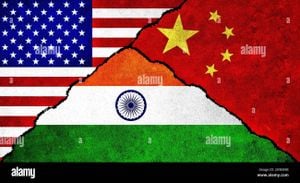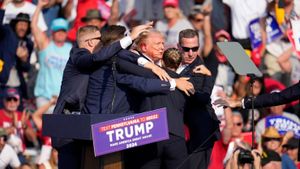Recent diplomatic tensions between Canada and India have taken center stage, igniting discussions about the Khalistan separatist movement and its influence within Canadian politics. This situation intensified dramatically after Canadian Prime Minister Justin Trudeau accused the Indian government of being involved in the assassination of Hardeep Singh Nijjar, which sent shockwaves through diplomatic circles and heightened existing strains between the two nations.
Nijjar, who was actively involved with the Khalistan movement—a push for the creation of a separate Sikh state—was shot dead outside of his gurdwara (place of worship) in British Columbia. Trudeau’s allegations have raised serious questions about the safety of the Indian community living abroad, and have especially struck at the heart of Sikh Canadians who remain divided on the Khalistan issue.
Ujjal Dosanjh, once Canada’s minister of health and long-time advocate for the Sikh community, expressed concern about Trudeau’s handling of the situation. He labeled the Prime Minister’s comments and actions as exacerbation of the already fraught relations between Canada and India. Dosanjh, who has held both governmental and community leadership positions, remarked, ‘Trudeau, sociologically and politically, is an idiot,’ criticizing his failure to manage the Khalistan movement and its representatives within Canada effectively.
The Khalistan issue has historical roots. The push for Khalistan began to gain attention during the late 1970s and early 1980s, leading to significant violence, including the infamous Operation Blue Star where Indian troops stormed the Golden Temple, sparking significant outrage. The anger resulting from these events reverberated within the Sikh diaspora globally, leading to many embracing independence, sometimes through radical means.
This movement has garnered mixed reactions across Canada. Many Sikh Canadians denounce it, advocating integration and peaceful coexistence. Conversely, others assert their identity and the historical grievances of their ancestors, seeking justice and recognition for their cause. The Canadian government has had to tread carefully, balancing on the tightrope of political correctness and community loyalty.
The Canadian police have been frequently criticized for being perceived as ineffective against threats posed by radical elements, both from Khalistani separatists and their opposition. The recent warning from Indian officials urging Indian nationals to be cautious around Canadian Khalistanis has been enough to amplify fears among these communities.
Trudeau's subsequent statements, which called for vigilance and called out the potential threats posed by some extremists depicted as Khalistan advocates, have prompted anger among Sikh groups who perceive such comments as vindictive and damaging to harmonious community relations.
Critics of Trudeau argue his administration has failed to take decisive action against Khalistani extremism, leading to escalated tensions. Former Indian diplomats have even referred to Canada’s response to Sikh extremism as soft and ineffective, exacerbated by loosely interpreted freedom of speech laws. Canada is well-known for its multicultural stance, which some claim has emboldened extremist ideologies to fester and grow unchecked.
Despite these tensions, some voices within the Canadian government call for continued dialogue with India. They argue the importance of fostering positive relations without delving too deep or appearing to enable those advocating for separatism. Canada Foreign Affairs Minister Mélanie Joly emphasized the need for diplomatic channels to address these issues, rather than adopting a confrontational stance.
The Canadian and Indian administrations are now engulfed in discussions to find common ground, recognizing the importance of their collaboration which spans trade, culture, and other social ties. Canada’s significant Indian diaspora continues to pose both challenges and benefits, as it includes individuals who hold diverse views on the Khalistan issue.
Back home, the Indian government is watching these developments closely. Prime Minister Narendra Modi has made it abundantly clear he will not stand for any threats against Indian sovereignty or integrity, and the narrative around the Khalistan movement is no exception. The Ministry of External Affairs (MEA) has decried any actions or statements supporting separatist sentiments as counterproductive and harmful.
The diplomatic spat extends beyond mere allegations; it sees both nations reassessing their foreign policies and national security strategies. The Indian government has reportedly ramped up security around its international missions, wary of potential retaliatory actions by rabid elements capitalizing on the international visibility of the Khalistani discourse.
On social media, sentiments have turned sharply against Canada's perceived leniency toward Khalistani activists. Many Indian netizens have echoed their frustrations toward the Trudeau administration on platforms like Twitter, characterizing the Canadian government as complicit due to its toleration of extremism.
Experts suggest the fallout from this feud will not be resolved overnight. Both nations appear entrenched, with each side unwilling to budge without some considerable concessions. For many within the diaspora, both Canadian and Indian, this diplomatic tug-of-war raises poignant questions of identity, safety, and belonging. The young families caught in the middle find themselves grappling with uncertain futures as their home countries throw rhetorical bombs at one another instead of engaging meaningfully.
The Khalistan movement remains contentious, casting long shadows over the relationships between communities within Canada and their homeland, India. The diplomatic rift sparked a resurgence of activism among pro- and anti-Khalistan factions representing passionately held beliefs about where the community must focus its energy. Following the assassination of Nijjar and the resultant uproar, Trudeau finds his leadership tested on multiple fronts, needing to deftly navigate the fallout of this saga as Canadian unity is juxtaposed against the extreme ideological divisions.
Many fear the tensions may lead to increased incidents of violence, particularly as the events continue to polarize opinions across both nations. With the potential for greater international discourse around separatism and terrorism, experts stress the importance of intervention and discussion above violence and provocation.
Both Canada and India must reconsider their narratives, replacing aggression with mutual respect, to navigate the convoluted identity politics shaped significantly by the actions of their citizens abroad. Just as the past still reverberates between these two countries, the mountains of futures yet to be shaped hinge upon resolving these disputes amicably for generations to come.



